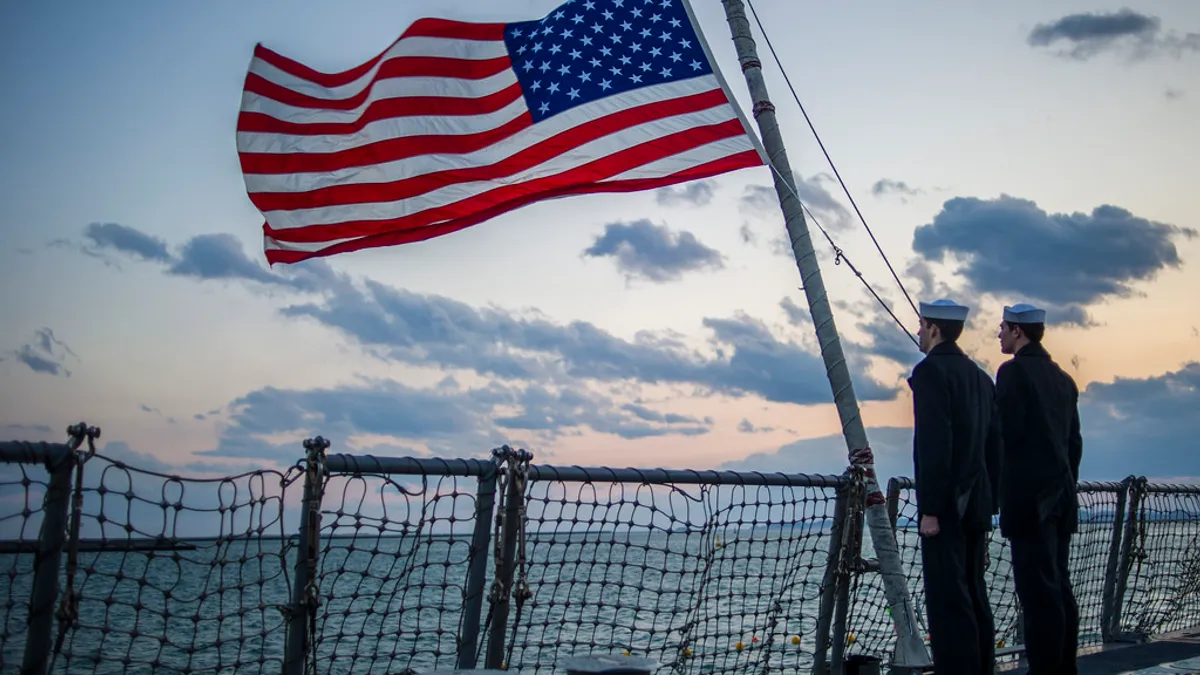Dive Brief:
- The U.S. Department of Veterans Affairs announced Monday that may stop allowing new students to use their GI Bill benefits at five universities, citing "sufficient evidence" that the institutions engaged in false or misleading advertising, sales or enrollment practices.
- It is giving the institutions — University of Phoenix, Colorado Technical University, American InterContinental University, Bellevue University and Temple University — 60 days to make changes before it will take action. Current students aren't affected, the VA notes.
- The decision comes as veterans advocates and others push for closer scrutiny of the extent to which for-profit colleges, in particular, are able to access military benefits.
Dive Insight:
Three of the five institutions named in the VA's decision are for-profit, a class of colleges that has been criticized for having too much of a focus on recruiting military veterans who can use GI Bill benefits to cover their tuition.
Those funds aren't included in a federal rule that prevents for-profit colleges from deriving more than 90% of their revenue from federal education aid programs. Called the 90/10 rule, it is a quality assurance measure that reasons sources other than the government should be willing to provide at least 10% of institutions' income.
A 2016 analysis by the U.S. Department of Education found that 17 for-profit institutions didn't qualify under the current rule. Requiring for-profit colleges to count GI Bill benefits toward meeting the 90/10 benchmark would have resulted in nearly 200 of them not making the cut, according to the department's report.
There is also concern from watchdog groups about how military benefits are administered.
The VA's Office of the Inspector General (OIG) found in a 2018 audit that of 175 programs approved by six state oversight agencies, 35 had unsupported or improper approvals, missing or delayed reporting, or "potentially erroneous, deceptive, or misleading advertisements."
Those programs received more than $1.54 million in veterans benefits payments during the audit period of February 2015 through January 2016. The vast majority, 97%, went to for-profit colleges.
OIG found that in the coming five years, the department would issue $2.3 billion in improper payments to schools if it didn't improve its oversight measures.
Advocacy groups for years have been pushing the VA to step up its scrutiny of colleges approved to accept military education benefits. While veterans tend to perform better academically than their peers, they are less likely to enroll in schools with high graduation rates, one report found.
A spokesperson from Perdoceo Education Corporation, the parent company of American InterContinental and Colorado Technical universities, told Education Dive in an email, "We believe that we can demonstrate to the VA that we are in full compliance with their requirements and that necessary corrective action, if any, has already been taken."
Colorado Technical University was among the top recipients of GI Bill funds from 2009 to 2017, according to a 2019 report from advocacy group Veterans Success. It received $284.5 million for the period, and it spent just 8.2% of gross tuition and fees on instruction in 2017 — the smallest share among the institutions that ranked in the top 10.
The University of Phoenix received the most GI funding for the period at $1.9 billion. It spent 15.3% of gross tuition and fees on instruction. The three nonprofit or public colleges on the top 10 list each spent 31% or more on instruction in 2017, while just one for-profit college did.
A spokesperson for the University of Phoenix told Education Dive in an email that the institution "will respond expeditiously to the VA's teams that are handling the review process" and is "working to assure no disruptions" to current or future students. They pointed to a recent settlement with the Federal Trade Commission (FTC), saying the marketing campaign it had issues with ended six years ago and under prior ownership.
"The University admitted no wrongdoing in choosing to settle with the FTC and continues to believe we acted appropriately," the spokesperson wrote.
A Temple University spokesperson told Education Dive in an email that the university received notice from the VA "and will respond as requested to demonstrate the substantial corrective actions that have been undertaken."
A Bellevue University spokesperson said the institution is still reviewing the VA's notice but said it is related to a complaint about accreditation for one of its nursing programs that the Nebraska Attorney General filed nearly 14 months ago. "We are contesting the AG's complaint in the courts and believe that the evidence will show that no students were misled on the status of our nursing program accreditation," the spokesperson said.














